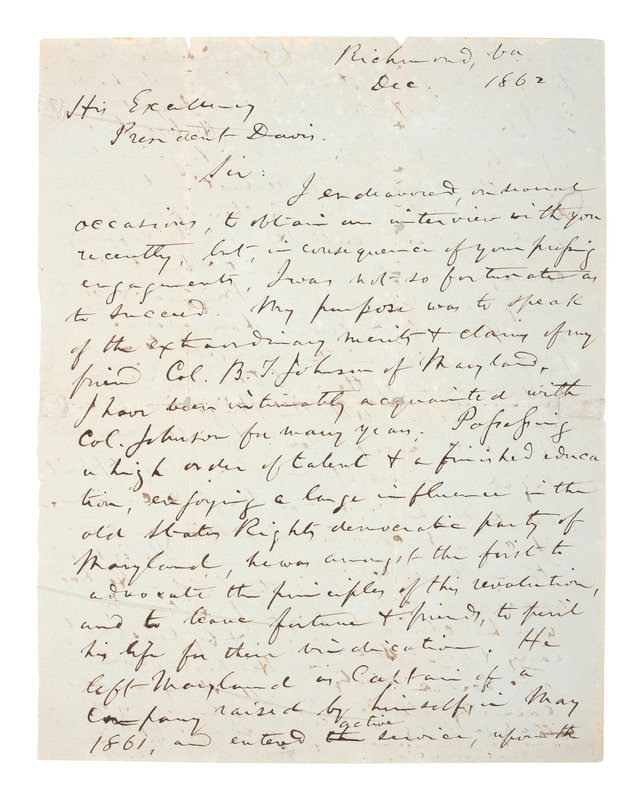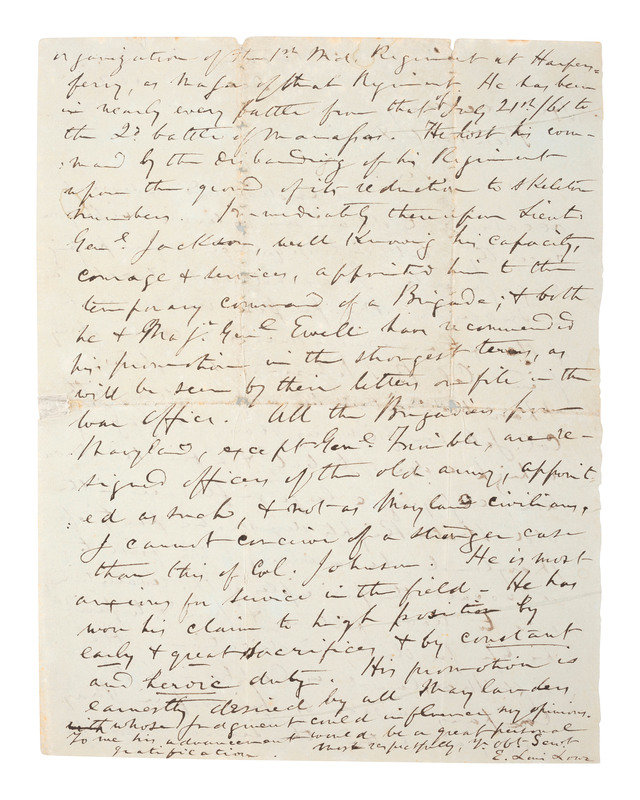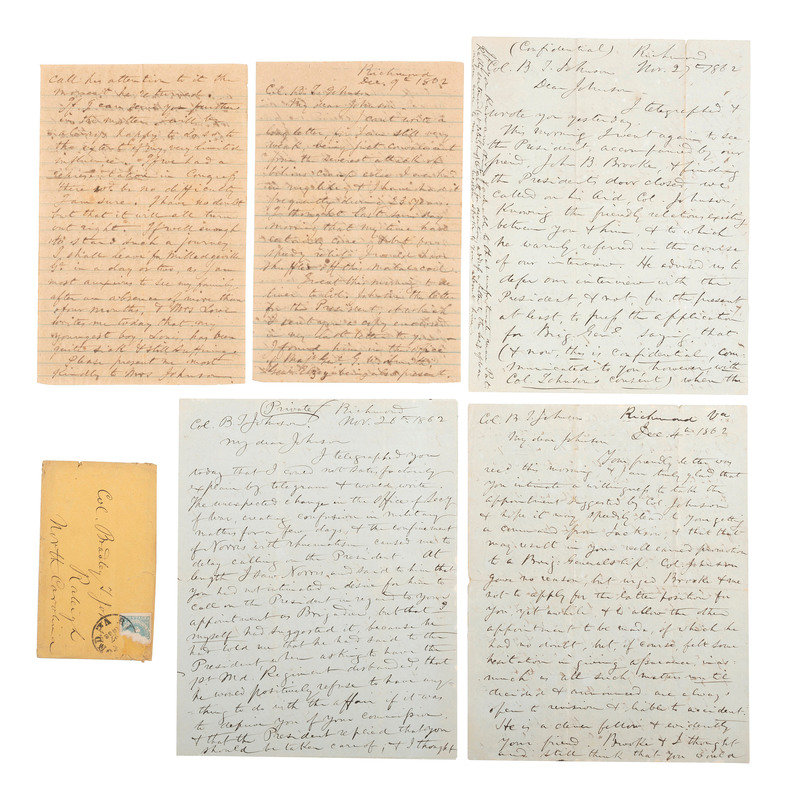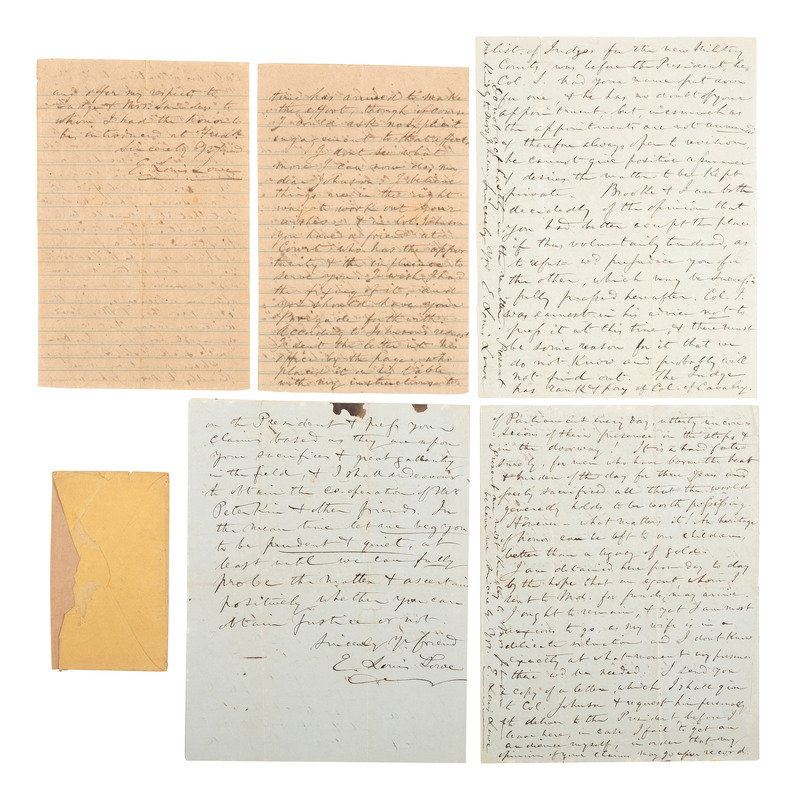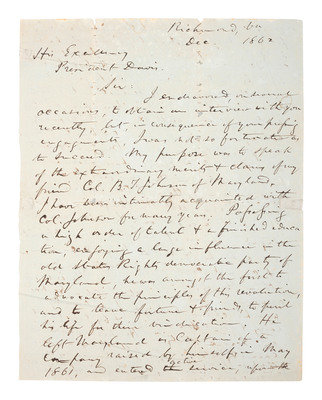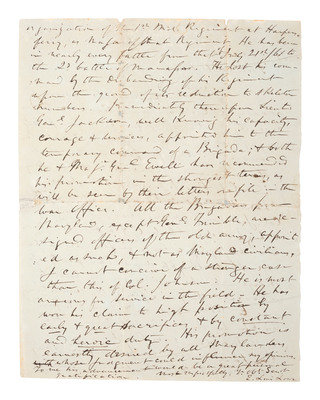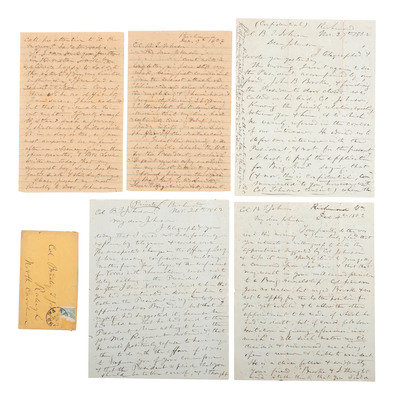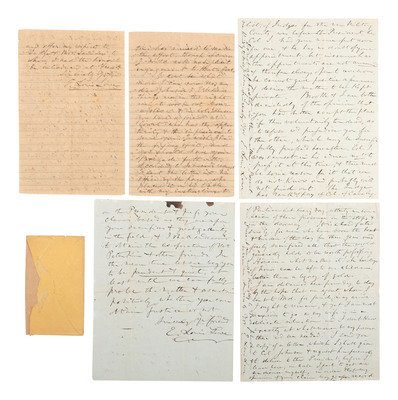[CIVIL WAR]. A collection of 5 ALsS from E. Louis Lowe, former Governor of Maryland, regarding his efforts to seek an appointment for Colonel Bradley Johnson as a Brigadier General in the Confederate Army,
Sale 1095 - American Historical Ephemera & Photography, Featuring Property from the James Milgram, M.D., Collection of Broadsides, Ephemeral Americana & Historical Documents
Day 1 Lots 1-403
Nov 3, 2022
10:00AM ET
Day 2 Lots 404-634
Nov 4, 2022
10:00AM ET
Live / Cincinnati
Own a similar item?
Estimate
$800 -
1,000
Lot Description
[CIVIL WAR]. A collection of 5 ALsS from E. Louis Lowe, former Governor of Maryland, regarding his efforts to seek an appointment for Colonel Bradley Johnson as a Brigadier General in the Confederate Army,
incl. a description of his futile attempts to see Jefferson Davis. November-December 1862.
Important collection of letters sent by E. Louis Lowe, former Governor of Maryland, to Colonel Bradley Johnson regarding Lowe’s efforts to seek an appointment for Johnson as a brigadier general in the Confederate Army. The lot includes the following correspondence:
ALS, 4pp., Richmond, 26 November 1862 to Colonel Bradley Johnson. Describes Lowe's futile attempts to see President Jefferson Davis to press the case for an appointment for Johnson as Brigadier General. "...I sat in that ante-chamber from 11 to 1:35- two hours and thirty-five minutes!... I fear, my dear Brad, that Maryland and Marylanders are of little account in the Southern Confederacy at this time and I cannot flatter myself that I have any influence...."
[With:] ALS, 2pp., Richmond, 27 November 1862 to Colonel Bradley Johnson; with cover. Lowe recounts a meeting with Colonel Johnson, Military Aide to President Davis, in which he is informed that Bradley Johnson is to receive an appointment as a Judge in the Military Court. "He advised us to defer our interview with the President & not, for the present at least, to press the application for a Brig. Genl...."
[With:] ALS, 4pp., Richmond, 4 December 1862 to Colonel Bradley Johnson. Lowe expresses satisfaction that Johnson has considered the appointment to a military judgeship and reflects upon his own situation and prospects. "I am truly glad that you intimate a willingness to take the appointment suggested by Col. Johnson and hope that it may speedily lead to your getting a command from Jackson, and that may well result in your well-earned promotion to a Brigadier Generalship….Sixteen months of painful anxiety has finally brought me to the less painful certainty that there is nothing open for me in this war but the musket of a private soldier which I would gladly assume were the necessities of my family other than what they are, here alone among comparative strangers, and were it possible for one of my age and past habits to undergo the hardships of such a position. Whilst I really believe that the President and many of our public men have a kindly feeling toward Maryland, it is nevertheless apparent that Marylanders occupy a most galling and humiliating position - foreigners without local habitation or name, no representation in congress, no certainty or even probability that our state will have it in her power to unite with the south in war or peace, we are indeed in the attitude of the miserable French refugees of the last century who had the honor of seeing Pitt pass into the House of Parliament every day, utterly unconscious of their presence on the steps or in the doorway! It is a hard fate.... However, what matters it! An heritage of honor can be left to our children better than a legacy of Gold."
[With:] ALS, 2pp., Richmond, December 1862, signed copy of Lowe's letter to President Jefferson Davis, writing on behalf of Johnson, "...he was among the first to advocate the principles of this Revolution and to leave fortune and friends to peril his life for their vindication. He left Maryland as a captain of a company raised by himself, in May, 1861, and entered active service upon the organization of the 1st Md. Regiment at Harper's Ferry, as Major of that regiment. He has been in nearly every battle from that of July 21st/61 to the 2d. battle of Manassas. He lost his command upon the disbanding of his regiment...immediately thereupon, Lieut. Genl. Jackson, well-knowing his capacity, courage and services, appointed him temporary command of a brigade and both he and Maj. Genl. Ewell have recommended his promotion in the strongest terms...I cannot conceive of a stronger case than this of Col. Johnson. He is most anxious for service in the field - He has won his claim to high position by early & great sacrifices & by constant and heroic duty. His promotion is earnestly desired by all Marylanders...."
[Also with:] ALS, 6pp., Richmond, 9 December 1862, to Colonel Bradley Johnson, describing a meeting with Colonel Johnson, Military Aide to President Jefferson Davis, Major General G.W. Smith, and General Elzey discussing Bradley Johnson's desire for an appointment as Brigadier General. "Smith read the letter (Lowe's letter to Davis)...and Smith said most emphatically 'Governor, I agree in all you have written about Johnson - he has greatly distinguished himself and merits promotion.' He then appealed to Elzey who spoke of you in high terms. I am satisfied that Smith will back you....If I can serve you further in the matter I will be always happy to do so to the extent of my very limited influence. If we had representation in congress there would be no difficulty I am sure."
Together, 5 letters forming an important grouping of correspondence reflecting the frustration of Marylanders seeking advancement and recognition in the Confederacy.
Enoch Louis Lowe (1820-1892) was from Frederick, Maryland, and was educated abroad in Dublin and Lancashire. Returning in 1839 he was admitted to the bar in 1842 and elected to the Maryland House of delegates in 1845. He served as Governor of Maryland 1850-1853 and was a Democratic elector for Breckenridge 1860. Lowe moved to Richmond at the outbreak of the Civil War and remained in the South during the war where he engaged in efforts to further the interests of his fellow Marylanders.
Bradley Tyler Johnson (1829-1903) was a lawyer and served as Attorney of Maryland. He was a Democratic elector for Breckenridge 1860. At the outbreak of the Civil War, Johnson helped organize the 1st Maryland Regiment of the Confederate Army. As a major, he served with the regiment in Johnston's Valley Campaign and at First Manassas. As Colonel, he commanded the 1st Maryland under Ewell and Jackson at Front Royal, Winchester and Harrisonburg (1862). Left without command upon the disbanding of his regiment, he assumed temporary command of J.R. Jones' brigade at Second Manassas and Gettysburg. He later commanded the Maryland Cavalry under Wade Hampton, and in February 1864, successfully checked Kilpatrick's raid. He was commissioned a Brigadier General 28 June 1864 and served with Early in the Valley and in Maryland. After the war he practiced law in Richmond and Baltimore and among other works, wrote the section on Maryland in Confederate Military History (1899).
Important collection of letters sent by E. Louis Lowe, former Governor of Maryland, to Colonel Bradley Johnson regarding Lowe’s efforts to seek an appointment for Johnson as a brigadier general in the Confederate Army. The lot includes the following correspondence:
ALS, 4pp., Richmond, 26 November 1862 to Colonel Bradley Johnson. Describes Lowe's futile attempts to see President Jefferson Davis to press the case for an appointment for Johnson as Brigadier General. "...I sat in that ante-chamber from 11 to 1:35- two hours and thirty-five minutes!... I fear, my dear Brad, that Maryland and Marylanders are of little account in the Southern Confederacy at this time and I cannot flatter myself that I have any influence...."
[With:] ALS, 2pp., Richmond, 27 November 1862 to Colonel Bradley Johnson; with cover. Lowe recounts a meeting with Colonel Johnson, Military Aide to President Davis, in which he is informed that Bradley Johnson is to receive an appointment as a Judge in the Military Court. "He advised us to defer our interview with the President & not, for the present at least, to press the application for a Brig. Genl...."
[With:] ALS, 4pp., Richmond, 4 December 1862 to Colonel Bradley Johnson. Lowe expresses satisfaction that Johnson has considered the appointment to a military judgeship and reflects upon his own situation and prospects. "I am truly glad that you intimate a willingness to take the appointment suggested by Col. Johnson and hope that it may speedily lead to your getting a command from Jackson, and that may well result in your well-earned promotion to a Brigadier Generalship….Sixteen months of painful anxiety has finally brought me to the less painful certainty that there is nothing open for me in this war but the musket of a private soldier which I would gladly assume were the necessities of my family other than what they are, here alone among comparative strangers, and were it possible for one of my age and past habits to undergo the hardships of such a position. Whilst I really believe that the President and many of our public men have a kindly feeling toward Maryland, it is nevertheless apparent that Marylanders occupy a most galling and humiliating position - foreigners without local habitation or name, no representation in congress, no certainty or even probability that our state will have it in her power to unite with the south in war or peace, we are indeed in the attitude of the miserable French refugees of the last century who had the honor of seeing Pitt pass into the House of Parliament every day, utterly unconscious of their presence on the steps or in the doorway! It is a hard fate.... However, what matters it! An heritage of honor can be left to our children better than a legacy of Gold."
[With:] ALS, 2pp., Richmond, December 1862, signed copy of Lowe's letter to President Jefferson Davis, writing on behalf of Johnson, "...he was among the first to advocate the principles of this Revolution and to leave fortune and friends to peril his life for their vindication. He left Maryland as a captain of a company raised by himself, in May, 1861, and entered active service upon the organization of the 1st Md. Regiment at Harper's Ferry, as Major of that regiment. He has been in nearly every battle from that of July 21st/61 to the 2d. battle of Manassas. He lost his command upon the disbanding of his regiment...immediately thereupon, Lieut. Genl. Jackson, well-knowing his capacity, courage and services, appointed him temporary command of a brigade and both he and Maj. Genl. Ewell have recommended his promotion in the strongest terms...I cannot conceive of a stronger case than this of Col. Johnson. He is most anxious for service in the field - He has won his claim to high position by early & great sacrifices & by constant and heroic duty. His promotion is earnestly desired by all Marylanders...."
[Also with:] ALS, 6pp., Richmond, 9 December 1862, to Colonel Bradley Johnson, describing a meeting with Colonel Johnson, Military Aide to President Jefferson Davis, Major General G.W. Smith, and General Elzey discussing Bradley Johnson's desire for an appointment as Brigadier General. "Smith read the letter (Lowe's letter to Davis)...and Smith said most emphatically 'Governor, I agree in all you have written about Johnson - he has greatly distinguished himself and merits promotion.' He then appealed to Elzey who spoke of you in high terms. I am satisfied that Smith will back you....If I can serve you further in the matter I will be always happy to do so to the extent of my very limited influence. If we had representation in congress there would be no difficulty I am sure."
Together, 5 letters forming an important grouping of correspondence reflecting the frustration of Marylanders seeking advancement and recognition in the Confederacy.
Enoch Louis Lowe (1820-1892) was from Frederick, Maryland, and was educated abroad in Dublin and Lancashire. Returning in 1839 he was admitted to the bar in 1842 and elected to the Maryland House of delegates in 1845. He served as Governor of Maryland 1850-1853 and was a Democratic elector for Breckenridge 1860. Lowe moved to Richmond at the outbreak of the Civil War and remained in the South during the war where he engaged in efforts to further the interests of his fellow Marylanders.
Bradley Tyler Johnson (1829-1903) was a lawyer and served as Attorney of Maryland. He was a Democratic elector for Breckenridge 1860. At the outbreak of the Civil War, Johnson helped organize the 1st Maryland Regiment of the Confederate Army. As a major, he served with the regiment in Johnston's Valley Campaign and at First Manassas. As Colonel, he commanded the 1st Maryland under Ewell and Jackson at Front Royal, Winchester and Harrisonburg (1862). Left without command upon the disbanding of his regiment, he assumed temporary command of J.R. Jones' brigade at Second Manassas and Gettysburg. He later commanded the Maryland Cavalry under Wade Hampton, and in February 1864, successfully checked Kilpatrick's raid. He was commissioned a Brigadier General 28 June 1864 and served with Early in the Valley and in Maryland. After the war he practiced law in Richmond and Baltimore and among other works, wrote the section on Maryland in Confederate Military History (1899).
This lot is located in Cincinnati.
Property from William H. Itoh, collector, historian and retired Foreign Service Officer
Condition Report
Auction Specialist
